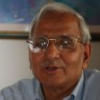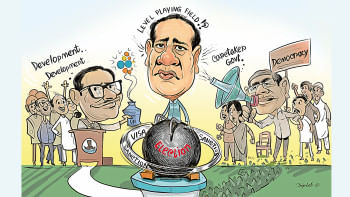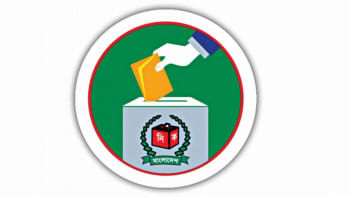The Election Commission’s credibility problem

Recently, Chief Election Commissioner (CEC) Kazi Habibul Awal frankly admitted that the Election Commission (EC) was facing a credibility problem. He attributed this problem to the controversial 2014 and 2018 general elections. We commend the CEC for admitting that the last two elections were indeed controversial. However, we respectfully request that the CEC and his colleagues look back and reflect upon how they themselves may have created this credibility problem in the first place.
Let's begin with the EC's appointment. According to The Chief Election Commissioner and Other Election Commissioners Appointment Act, 2022, only political parties and professional bodies are entitled to propose names, from which the Search Committee is to recommend names to the president for appointment to the commission. But the committee allowed anyone and everyone to propose names, even their own, which is a clear violation of the law. We know from the public statement of late Dr Zafrullah Chowdhury, who was not eligible to propose names, that he recommended Awal for the CEC's post. Other ineligible individuals must have proposed names of other commissioners, which clearly makes the appointment of the present commission legally questionable. There are serious allegations that this violation was part of a strategy to appoint the ruling party's chosen individuals to the commission. The inclusion of former election commissioner Sohul Hossain, who sought nomination from the Awami League in the last election, in the Search Committee clearly adds currency to this allegation.
Furthermore, the law required that the appointment be made in a transparent manner. But unlike its predecessor, the Search Committee did not even make public the names of the 10 finalists recommended to the president. All this created suspicions of behind-the-scenes manipulations in the appointment of the Awal commission. This author tried to remove this suspicion by making an RTI application, but the Cabinet Division failed to disclose the relevant information, against which a case is now pending before the High Court.
Let's now look at the EC's own controversial acts, which contributed to its credibility problem. One may recall that during the Cumilla city election, the first important election during its tenure, the Awal commission made an unfortunate flip-flop first by ordering lawmaker AKM Bahauddin Bahar to leave the city and then reversing its decision after his defiance. The commission also failed to explain the mystery behind the reversal of the final election outcome, causing the defeat of the departing mayor Monirul Haque based on the results of four centres that arrived last – several hours after the closure of polling carried out using EVMs. In absence of the EVMs' paper trail, results could not be recounted to verify its authenticity.
Talking about the EVMs, the EC vehemently insisted on using it at first in all 300 constituencies and later in at least 150 constituencies, even though Prof Jamilur Reza Choudhury, who was the head of the EC-appointed technical committee, refused to endorse the purchase of EVMs without paper trail. To justify the purchase of 200,000 new EVMs at the cost of nearly Tk 9,000 crore, the EC even misrepresented the number of political parties that supported the use of EVMs. In the absence of the EVMs' paper trail, the results declared by the EC are final and cannot be verified by recount, which is why the EC could not counter Hero Alom's allegation that he was defeated in Bogura-4 by-election through manipulation.
The EC's decision to register Bangladesh Nationalist Movement (BNM) and Bangladesh Supreme Party (BSP), whose name most people have never heard of, also badly hurt its credibility. While it confirmed registration of these two parties, allegedly propped up by vested quarters, it denied registration to several other parties, which have visible activities throughout the country.
The Gaibandha-5 by-election, held in January this year, also badly undermined the EC's credibility. That by-election, if one may recall, was cancelled due to widespread rigging observed through CCTV cameras installed at every polling centre. However, the investigation committee formed by the EC failed to hold to account the deputy commissioner and the superintendent of police in the district, under whose watch the rigging took place. The EC also failed to punish the small fries – the lower-level functionaries – even though it had the authority to do so.
The EC's credibility was further tarnished by the Dhaka-17 by-election, which was not contested by major political parties like BNP. It may be recalled that during the election, Hero Alom, a minor contestant, was beaten up in front of a polling centre, raising serious questions about the EC's capacity to peacefully hold even a by-election in one single constituency.
In addition, the election commissioners hurt their credibility by making untrue and misleading statements. For example, in 2022, the EC sent several recommendations to the law ministry for amending the Representation of People Order (RPO). In its recommendations, the EC proposed to replace the term "election" by "polling" in Section 91, reducing its authority to postpone the election or cancel results because of anomalies, on the day of the polling rather than during the entire election cycle. When this became public, the EC first denied, but later admitted to it, claiming that the change would not reduce its authority, despite the contrary view of all other election experts.
Finally, the EC's decision to go ahead with the coming election, even though major political parties such as BNP, Islamic Andolon, and others have declared not to participate under the present constitutional framework, raises serious questions about its credibility. We know from our history that we never had free and fair elections held under the party in power, and the same is bound to happen even if all parties contest the election, as in 2018. Given this, one cannot help but conclude that by insisting on going ahead with the election, the EC wants to ensure that the ruling party stays in power. The plausibility of this conclusion becomes apparent with the CEC's assertion that what is important is people can vote without any hindrance, rather than who is contesting and who is not. This is clearly a justification for holding a one-sided election, defying the very definition of the term "election," which involves choice – voters choosing from credible alternatives. With such a one-sided election, we strongly feel that the EC would not be able to meet its constitutional obligation to hold free, fair and credible elections.
Dr Badiul Alam Majumdar is secretary of SHUJAN: Citizens for Good Governance.
Views expressed in this article are the author's own.
Follow The Daily Star Opinion on Facebook for the latest opinions, commentaries and analyses by experts and professionals. To contribute your article or letter to The Daily Star Opinion, see our guidelines for submission.

 For all latest news, follow The Daily Star's Google News channel.
For all latest news, follow The Daily Star's Google News channel. 









Comments